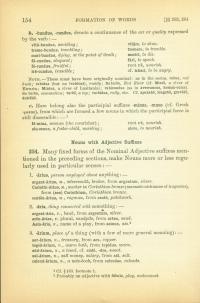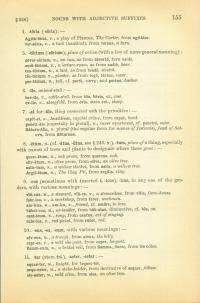254. Many fixed forms of the nominal adjective suffixes mentioned in the preceding sections, make nouns more or less regularly used in particular senses.
- -ārius person employed about anything.
argent-ārius silversmith, broker from argentum silver
Corinthi-ārius worker in Corinthian bronze [m.] (sarcastic nickname of Augustus) from (aes) Corinthium Corinthian bronze
centōn-ārius ragman [m.] from centō patchwork
- -āria thing connected with something.
argent-āria bank [f.] from argentum silver
arēn-āriae sandpits [f. pl.] from arēna sand
Asin-āria name of a play [f.] from asinus ass1
- -ārium place of a thing (with a few of more general meaning).
aer-ārium treasury [n.] from aes copper.
tepid-ārium warm bath [n.] from tepidus warm
sūd-ārium a towel [n.] cf. sūdō, -āre sweat
sal-ārium salt money, salary [n.] from sāl salt
calendārium a notebook [n.] from calendae calends
- -tōria (-sōria).
Agitā-tōria The Carter [f.] a play by Plautus from agitātor
vor-sōria a tack (nautical) [f.] from vorsus a turn
- -tōrium (-sōrium), place of action (with a few of more general meaning).
dēvor-sōrium an inn [n.] as from dēvortō turn aside
audī-tōrium a lecture hall [n.] as from audiō hear
ten-tōrium a tent [n.] as from tendō stretch
tēc-tōrium plaster [n.] as from tegō, tēctus cover
por-tōrium toll [n.] cf. portō carry, and portus harbor
- -īle animal stall.
bov-īle cattle-stall [n.] from bōs, bŏvis ox, cow
ov-īle sheepfold [n.] from ovis sheep (stem ovi-)
- -al for -āle thing connected with, the primitive.
capit-al headdress, capital crime [n.] from caput head
penetr-āle inner apartment [n.] cf. penetrō enter
Sāturn-ālia feast of Saturn [n. pl.] (the regular form for the names of festivals) from Sāturnus
- -ētum [n.] (cf. -ātus, -ūtus, see § 246, Note), -tum place of a thing, especially with names of trees and plants to designate where they grow.
querc-ētum oak grove [n.] from quercus oak
olīv-ētum olive grove [n.] from olīva an olive tree
salic-tum a willow thicket [n.] from salix a willow tree
Argil-ētum The Clay Pit [n.] from argilla clay
- -cus (sometimes with inserted i, -icus), -īcus, in any one of the genders, with various meanings.
vīli-cus a steward [m.], vīli-ca a stewardess [f.] from vīlla farmhouse
fabr-ica a workshop [f.] from faber workman
am-īcus [m.] am-īca [f.] friend, cf. amāre to love
būbul-cus ox-tender [m.] from būb-ulus, diminutive; cf. bōs ox
cant-icum song [n.] from cantus act of singing
rubr-īca red paint [f.] from ruber red
- -eus, -ea, -eum, with various meanings.
alv-eus a trough [m.] from alvus the belly
capr-ea a wild she-goat [f.] from caper he-goat
flamm-eum a bridal veil [n.] from flamma flame (from its color)
- -ter (stem tri-), -aster, -ester
eques-ter knight [m.] for †equet-ter
sequ-ester a stake-holder [m.] from a derivative of sequor follow
ole-aster wild olive [m.] from olea an olive tree


